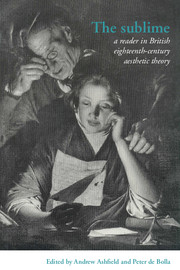Book contents
- Frontmatter
- Contents
- List of Abbreviations
- Introduction
- Part I The Longinian tradition
- Part II Rhapsody to rhetoric
- 11 The spectator, (1712-1714)
- 12 A discourse on ancient and modern learning (1734)
- 13 Characteristicks (1714)
- 14 The works (1724)
- 15 To David Fordyce, 18th June 1742
- 16 The pleasures of imagination (1744)
- 17 An essay on the sublime (1747)
- 18 Observations on man (1749)
- 19 Lectures on the sacred poetry of the Hebrews (1753/1787)
- 20 A dictionary of the English language (1755)
- 21 Conjectures on original composition (1759)
- 22 The art of speaking (1761)
- 23 A course of lectures on oratory and criticism (1777)
- 24 An enquiry concerning the principles of taste (1785)
- Part III Irish Perspectives
- Part IV The Aberdonian Enlightenment
- Part V Edinburgh and Glasgow
- Part VI From the Picturesque to the Political
- Sources and further reading
12 - A discourse on ancient and modern learning (1734)
Published online by Cambridge University Press: 05 June 2012
- Frontmatter
- Contents
- List of Abbreviations
- Introduction
- Part I The Longinian tradition
- Part II Rhapsody to rhetoric
- 11 The spectator, (1712-1714)
- 12 A discourse on ancient and modern learning (1734)
- 13 Characteristicks (1714)
- 14 The works (1724)
- 15 To David Fordyce, 18th June 1742
- 16 The pleasures of imagination (1744)
- 17 An essay on the sublime (1747)
- 18 Observations on man (1749)
- 19 Lectures on the sacred poetry of the Hebrews (1753/1787)
- 20 A dictionary of the English language (1755)
- 21 Conjectures on original composition (1759)
- 22 The art of speaking (1761)
- 23 A course of lectures on oratory and criticism (1777)
- 24 An enquiry concerning the principles of taste (1785)
- Part III Irish Perspectives
- Part IV The Aberdonian Enlightenment
- Part V Edinburgh and Glasgow
- Part VI From the Picturesque to the Political
- Sources and further reading
Summary
… Another great pleasure the ancients had beyond us, if we consider them as the poet's countrymen, was, that they lived as it were on the spot, and within the verge of the poem; their habitations lay among the scenes of the Æneid; they could find out their own country in Homer, and had every day perhaps in their sight the mountain or field where such an adventure, or such a battle was fought. Many of them had often walked on the banks of Helicon, or the sides of Parnassus, and knew all the private haunts and retirements of the muses: so that they lived as it were on fairy ground, and conversed in an enchanted region, where every thing they looked upon appeared romantic, and gave a thousand pleasing hints to their imaginations. To consider Virgil only in this respect: how must a Roman have been pleased that was well acquainted with the capes and promontories, to see the original of their names, as they stand derived from Misenus, Palinurus and Cajeta? That could follow the poet's motions, and attend his hero in all his marches from place to place? That was very well acquainted with the lake Amsanctus, where the fury sunk, and could lead you to the mouth of the cave where Æneas took his descent for hell? Their being conversant with the place where the poem was transacted, gave them a greater relish than we can have at present of several parts of it; as it affected their imaginations more strongly, and diffused through the whole narration a greater air of truth.
- Type
- Chapter
- Information
- The SublimeA Reader in British Eighteenth-Century Aesthetic Theory, pp. 70 - 71Publisher: Cambridge University PressPrint publication year: 1996

